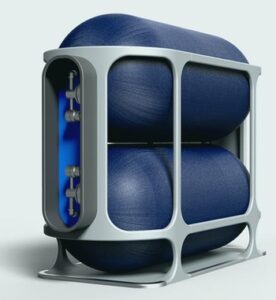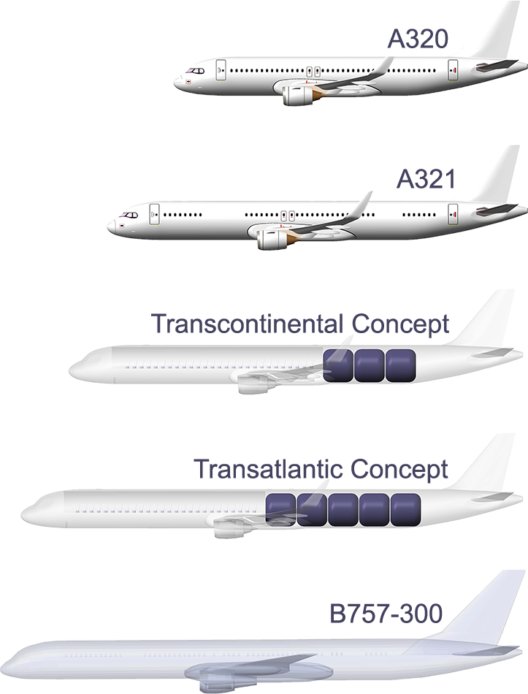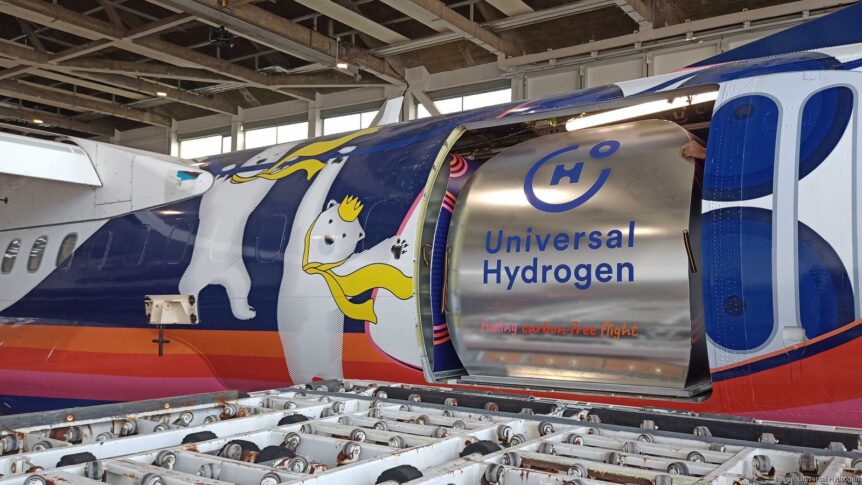On February 7, 2023, Universal Hydrogen received a Special Airworthiness Certificate in the Experimental category from the Federal Aviation Administration. This will allow their DeHavilland Dash 8-300 to begin test flights. Universal boasts their craft will be the largest hydrogen fuel cell-powered aircraft ever to fly. Up to now, it’s been performing taxi tests and motor runups, getting ready for the big day.
On a Mission
Universal Hydrogen’s web site opens with this statement: “Our mission is to put aviation on a trajectory to meet Paris Agreement emissions targets by making hydrogen-powered commercial flight a near-term reality.” The coming flight tests are a major step toward fulfillment of that mission.
Inclusion of the large hydrogen-carrying modules reduces passenger carrying capacity to 40 seats. But, the modules allow easy loading and unloading and “eliminate the need for costly new infrastructure, with any airport capable of handling cargo being hydrogen-ready.”

Universal Hydrogen capsules can easily be placed and fastened in the rear part of aircraft – courtesy: Universal Hydrogen
Paul Eremenko, co-founder and CEO of Universal Hydrogen, explains, “We are simultaneously providing a pragmatic, near-term solution for hydrogen infrastructure and delivery, as well as for converting existing passenger aircraft to use this lightweight, safe, and true-zero-emissions fuel. Today’s milestones are essential, important steps to putting the industry on a trajectory to meet Paris Agreement obligations. The only alternative is curtailing aviation traffic growth to curb emissions.”
With its megawatt-class H2 powertrain in one nacelle, the installation resembles Universal Hydrogen’s conversion kit for ATR 72-600 regional airliners. Power will flow directly from the H2 fuel cells to the electric motor, simpler and less expensive than a hybrid battery setup.

Universal Hydrogen will have flown the largest H2-powered aircraft to this point, but has even bigger ambitions
Test flights will take place at Grant County Airport in Moses Lake, Washington, site of last year’s successful first flight of Eviation’s Alice. Universal reports, “The aircraft will be by far the largest hydrogen fuel cell-powered airplane to take to the skies and second as a hydrogen-powered aircraft only to the Soviet flight test in 1988 of a Tupolev Tu-155 airliner with one of its jet engines converted to burn hydrogen.”
There’s Nothing New Under the Sun
Proof that the Soviets were thinking green as early as 1988, the Tupolev TU-155 flew on hydrogen that year.
Rita Chewe, a project manager for Airbus in Toulouse, France where engine tests took place, wrote the following: “The designer of the Tu-155, Andrei Nikolayevich Tupolev, was such an astonishing pioneer of Aircraft Design. The Tu-155 used cryogenics to store fuel, and it successfully made its first flight on the 15th of April 1988. Due to the fall of the Soviet Union, this project was discontinued.“
Notes with this video came from Airbus. “While manufacturers and aeronautical engine manufacturers are working on more ecological aviation, the Russian aircraft manufacturer Tupolev had already tried to take up the challenge of a hydrogen plane more than 30 years ago. The Tupolev Tu-155 was the first experimental aircraft to run on liquid hydrogen. Developed on the basis of the Tupolev Tu-154 Trijet, it made its first test flight on April 15, 1988. To be completely honest, only one of its three engines, the one on the right, was powered by liquid hydrogen . The flight was made at low altitude and only lasted about twenty minutes. Liquid hydrogen was stored in the rear part of the cabin. It took up a third of the space. Although promising, the development of a production version (Tu-156) of the aircraft will never see the light of day. The fall of the Soviet Union in 1991 definitively buried the project. The only test aircraft built has since been stored at Zhukovsky airport south of Moscow. Hydrogen would be one of the clean energies for aviation with the primary quality of no pollutant discharge into the atmosphere, but there are still several major constraints to be resolved, as explained in the report by Jean-Brice Dumont, director of engineering at Airbus.

